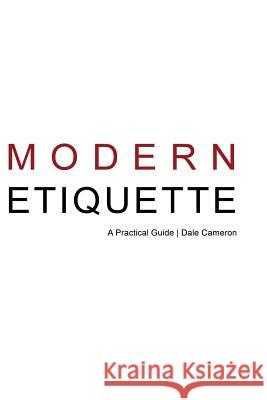Modern Etiquette: A Practical Guide » książka
Modern Etiquette: A Practical Guide
ISBN-13: 9781500356132 / Angielski / Miękka / 2014 / 84 str.
Etiquette is little more than a way to interact with those around us. It is less about a set of rules than it is about feeling confident and at ease with others. In a world where social skills are quickly becoming a rare commodity, good etiquette is an asset which helps us to advance both our careers and our relationships. FOREWORD It is not unusual for people to feel uncomfortable in common social situations. While we are all expected to know the basics of social etiquette, many of us can still feel inadequately prepared. Despite there being dozens of etiquette books available, few provide any information from a modern perspective. The focus has instead been on out-dated rules of chivalry and how to share a meal with the Queen. This lack of relevant advice means that many people have been left to find things out the hard way; a trial and error process which is time-wasting and unnecessary. Dissatisfied with the status quo, and determined to find a solution, we wrote this book so as to provide a relaxed and enjoyable way for people to find out how best to deal with social situations in today's society. It is not an all-inclusive view on every possible point of etiquette, but rather a practical discussion with real life examples of the key aspects; ranging from general conversational skills, to writing CVs and preparing for job interviews. Throughout this book, we provide real and sensible advice for a range of social situations so that we may all experience life in a way which makes the most of the opportunities presented to us. INTRODUCTION Over the years, etiquette has lost much of its significance as an acknowledged social concept. With the word itself now conjuring up nothing but dated cliches and old-fashioned rules of courtship, many would argue that it simply lacks relevance. Unfortunately, nothing could be further from the truth. Etiquette is little more than a way to interact with those around us. It is less about a set of rules than it is about feeling confident and at ease with others. In a world where social skills are quickly becoming a rare commodity, good etiquette is an asset which helps us to advance both our careers and our relationships. This book provides a modern perspective on the fundamentals of everyday life, and serves as a practical guide which is both domestically and internationally relevant. There are no cliches and there is no academic theory, just a discussion of real life situations in concise and simple language. Chapter 1: Meeting and Greeting Being introduced Shaking hands Meeting a group Making introductions Remembering names If you can't remember a name Cultural considerations Chapter 2: Conversation Eye contact Listening Being present Personalise How to disagree Chapter 3: Dating Asking someone out Setting up a first date On a first date Finances Conversation Showing affection Ending a relationship Chapter 4: Dining A good dinner guest Beginning a meal Behaviour at the table Table conversation Leaving the table Finishing a course Finishing a meal Utensils Hosting a dinner party Dietary requirements Chapter 5: Drinking Holding a wine glass Serving wine Wine terminology Types of Beer Types of Spirits Chapter 6: Special Occasions Preparing and responding to invitations Engagement parties Bridal shower Bachelor/Bachelorette parties Weddings Anniversaries Valentine's Day Birthdays Funerals Public holidays Making a toast Participating in a toast Thank you notes Chapter 7: Clothing Men's Clothing Women's Clothing Suits Tying a tie Chapter 8: Self-confidence Perception Self-improvement Compliments Criticism Competition Chapter 9: Public Speaking Preparation Content Opening Transitions Closing Delivery Chapter 10: CV Writing Covering letter CV layout Personal profile Key skills Employment summary Education summary References Handing out your CV Chapter 11: Job Interviews What to wear When to arrive Beginning an interview What you will be asked The end of an interview"
Zawartość książki może nie spełniać oczekiwań – reklamacje nie obejmują treści, która mogła nie być redakcyjnie ani merytorycznie opracowana.











